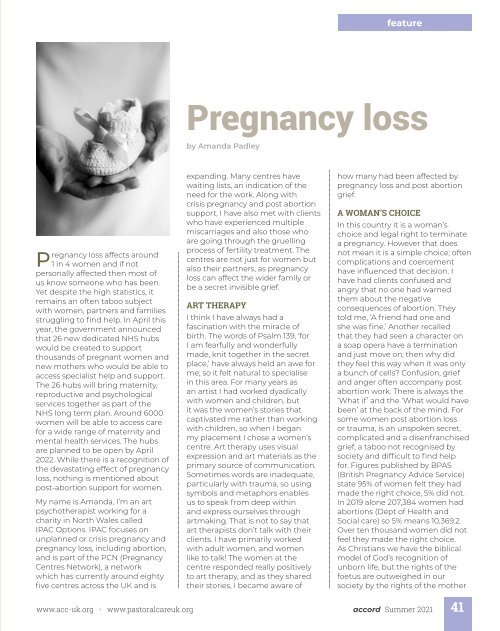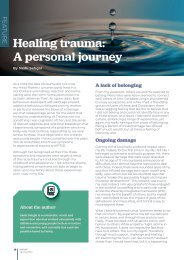ACC Accord Summer 2021 Issue 111
You also want an ePaper? Increase the reach of your titles
YUMPU automatically turns print PDFs into web optimized ePapers that Google loves.
feature<br />
Pregnancy loss<br />
by Amanda Padley<br />
Pregnancy loss affects around<br />
1 in 4 women and if not<br />
personally affected then most of<br />
us know someone who has been.<br />
Yet despite the high statistics, it<br />
remains an often taboo subject<br />
with women, partners and families<br />
struggling to find help. In April this<br />
year, the government announced<br />
that 26 new dedicated NHS hubs<br />
would be created to support<br />
thousands of pregnant women and<br />
new mothers who would be able to<br />
access specialist help and support.<br />
The 26 hubs will bring maternity,<br />
reproductive and psychological<br />
services together as part of the<br />
NHS long term plan. Around 6000<br />
women will be able to access care<br />
for a wide range of maternity and<br />
mental health services. The hubs<br />
are planned to be open by April<br />
2022. While there is a recognition of<br />
the devastating effect of pregnancy<br />
loss, nothing is mentioned about<br />
post-abortion support for women.<br />
My name is Amanda, I’m an art<br />
psychotherapist working for a<br />
charity in North Wales called<br />
IPAC Options. IPAC focuses on<br />
unplanned or crisis pregnancy and<br />
pregnancy loss, including abortion,<br />
and is part of the PCN (Pregnancy<br />
Centres Network), a network<br />
which has currently around eighty<br />
five centres across the UK and is<br />
expanding. Many centres have<br />
waiting lists, an indication of the<br />
need for the work. Along with<br />
crisis pregnancy and post abortion<br />
support, I have also met with clients<br />
who have experienced multiple<br />
miscarriages and also those who<br />
are going through the gruelling<br />
process of fertility treatment. The<br />
centres are not just for women but<br />
also their partners, as pregnancy<br />
loss can affect the wider family or<br />
be a secret invisible grief.<br />
ART THERAPY<br />
I think I have always had a<br />
fascination with the miracle of<br />
birth. The words of Psalm 139, ‘for<br />
I am fearfully and wonderfully<br />
made, knit together in the secret<br />
place,’ have always held an awe for<br />
me; so it felt natural to specialise<br />
in this area. For many years as<br />
an artist I had worked dyadically<br />
with women and children, but<br />
it was the women’s stories that<br />
captivated me rather than working<br />
with children, so when I began<br />
my placement I chose a women’s<br />
centre. Art therapy uses visual<br />
expression and art materials as the<br />
primary source of communication.<br />
Sometimes words are inadequate,<br />
particularly with trauma, so using<br />
symbols and metaphors enables<br />
us to speak from deep within<br />
and express ourselves through<br />
artmaking. That is not to say that<br />
art therapists don’t talk with their<br />
clients. I have primarily worked<br />
with adult women, and women<br />
like to talk! The women at the<br />
centre responded really positively<br />
to art therapy, and as they shared<br />
their stories, I became aware of<br />
how many had been affected by<br />
pregnancy loss and post abortion<br />
grief.<br />
A WOMAN’S CHOICE<br />
In this country it is a woman’s<br />
choice and legal right to terminate<br />
a pregnancy. However that does<br />
not mean it is a simple choice; often<br />
complications and coercement<br />
have influenced that decision. I<br />
have had clients confused and<br />
angry that no one had warned<br />
them about the negative<br />
consequences of abortion. They<br />
told me, ‘A friend had one and<br />
she was fine.’ Another recalled<br />
that they had seen a character on<br />
a soap opera have a termination<br />
and just move on; then why did<br />
they feel this way when it was only<br />
a bunch of cells? Confusion, grief<br />
and anger often accompany post<br />
abortion work. There is always the<br />
‘What if’ and the ‘What would have<br />
been’ at the back of the mind. For<br />
some women post abortion loss<br />
or trauma, is an unspoken secret,<br />
complicated and a disenfranchised<br />
grief, a taboo not recognised by<br />
society and difficult to find help<br />
for. Figures published by BPAS<br />
(British Pregnancy Advice Service)<br />
state 95% of women felt they had<br />
made the right choice, 5% did not.<br />
In 2019 alone 207,384 women had<br />
abortions (Dept of Health and<br />
Social care) so 5% means 10,369.2.<br />
Over ten thousand women did not<br />
feel they made the right choice.<br />
As Christians we have the biblical<br />
model of God’s recognition of<br />
unborn life, but the rights of the<br />
foetus are outweighed in our<br />
society by the rights of the mother<br />
www.acc-uk.org • www.pastoralcareuk.org accord <strong>Summer</strong> <strong>2021</strong><br />
41



